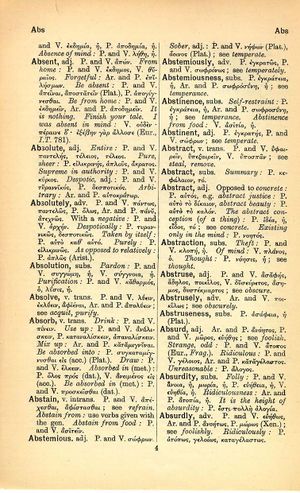absolute: Difference between revisions
Βουλὴν ἅπαντος πράγματος προλάμβανε → Nihil incohes, nisi inito consilio prius → Vor jedem Handeln fasse einen guten Plan
m (Text replacement - "}}]]" to "}}]]") |
mNo edit summary |
||
| Line 3: | Line 3: | ||
|link={{filepath:woodhouse_4.jpg}}]]'''adj.''' | |link={{filepath:woodhouse_4.jpg}}]]'''adj.''' | ||
[[entire]]: P. and V. [[παντελής]], [[τέλειος]], [[τέλεος]]. | |||
[[pure]], [[sheer]]: P. [[εἰλικρινής]], ἁπλοῦς, [[ἄκρατος]]. | |||
[[supreme]] in [[authority]]: P. and V. [[κύριος]]. | |||
[[despotic]], adj.: P. and V. [[τυραννικός]], P. [[δεσποτικός]]. | |||
[[arbitrary]]: Ar. and P. [[αὐτοκράτωρ]]. | |||
}} | }} | ||
{{Lewis | {{Lewis | ||
Revision as of 15:08, 9 September 2017
English > Greek (Woodhouse)
adj.
entire: P. and V. παντελής, τέλειος, τέλεος.
pure, sheer: P. εἰλικρινής, ἁπλοῦς, ἄκρατος.
supreme in authority: P. and V. κύριος.
despotic, adj.: P. and V. τυραννικός, P. δεσποτικός.
arbitrary: Ar. and P. αὐτοκράτωρ.
Latin > English (Lewis & Short)
absŏlūtē: adv., v. absolvo, P. a.
Latin > French (Gaffiot 2016)
absŏlūtē,¹⁵ d’une façon achevée, parfaite : Cic. Ac. 2, 55 ; Tusc. 4, 38 ; Or. 227 ; absolutius Plin. Min. Ep. 4, 27, 2 ; absolutissime Her. 2, 28 || d’une façon générale : Tert. Or. 21, etc. || [gramm.] absolument : Prisc. ; Don. Andr. 817 ; Eun. 459 ; Ad. 49 ; Phorm. 52.
Latin > German (Georges)
absolūtē, Adv. m. Compar. (Plin. ep. 4, 27, 2) u. Superl. (Cornif. rhet. 2, 28) (absolutus), I) in sich abgeschlossen, vollständig, vollkommen, Cic. u.a.: vivere, vollk. (= sittlich rein), Cic.: abs. doctus (Ggstz. mediocriter doctus), Suet. – II) ohne Zusatz, geradezu, schlechthin, inscriptum esse, Plin.: respondere, unbedingt, absolut, kategorisch, ICt.: dicere, ohne Umschweife, unumwunden, Amm. u. Auson. – als gramm. t.t., ohne Kasus, absolut, proferre verba transitiva, Prisc.: multa verba absolute sine coniunctione casus alicuius solent proferri, Prisc.

